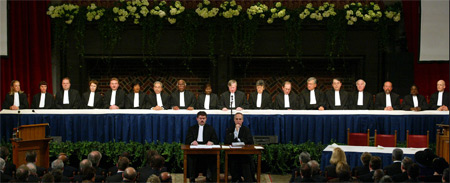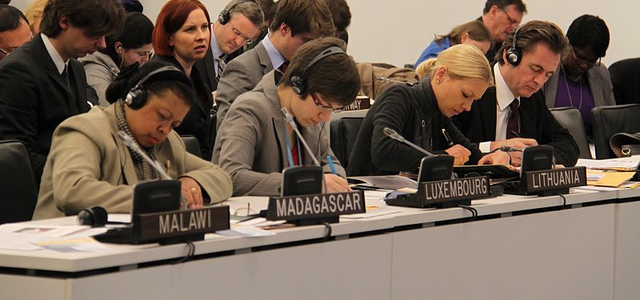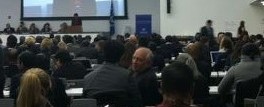 We would like to welcome Mariana Rodriguez Pareja, a communications expert and a human rights advocate with a special interest in international affairs and gender issues, as our lead associate contributor on the upcoming nominations and elections at the International Criminal Court. Mariana introduces us to elections at the Court in the following post, with expanded details coming soon.
We would like to welcome Mariana Rodriguez Pareja, a communications expert and a human rights advocate with a special interest in international affairs and gender issues, as our lead associate contributor on the upcoming nominations and elections at the International Criminal Court. Mariana introduces us to elections at the Court in the following post, with expanded details coming soon.
———————————
The International Criminal Court (ICC) is the first permanent and international criminal tribunal with the capacity to try individuals for genocide, crimes against humanity and war crimes when national courts are unable or unwilling to do so. In terms of elections and transparency, it is important to remember that the ICC is an independent institution. It was established by the Rome Statute, adopted in 1998 at a diplomatic conference in that city and which came into force in 2002 once the sixtieth state party deposited its instrument of ratification.
The governing body of the ICC – responsible for electing its officials, including the Judges, the Prosecutor and the Deputy Prosecutor(s) – is the Assembly of States Parties (ASP), which is comprised of the States that have ratified and acceded to the Rome Statute. The Assembly gathers at least once a year to discuss and make decisions about topics relevant to the Court’s work, including the elections. The 2011 elections will result in a significant change to the bench’s composition and to the Court’s structure.
This year, six judges – out of 18 – and the Chief Prosecutor will be elected. The terms of the six newly elected judges will be nine years, in accordance with Article 36(9) of the Statute. The nomination period will run from June 13 to September 2, 2011. The elections will be held during the following Assembly session, scheduled to begin on December 12.
The Assembly is also responsible for electing its own officials, such as the President of the Assembly and members of the Committee on Budget and Finance (CBF). In 2011 and early 2012, the Assembly will elect its President, two Vice-Presidents, a 21-member Bureau, six members of the Committee on Budget and Finance, ICC President and Vice Presidents will be elected.
 Overview of the Election of Judges
Overview of the Election of Judges
Each member of the Assembly, being a state party to the Rome Statute, may put forward one candidate for any given election. Nominees can be put forward by any member of the Assembly, not only their home government. However, no two judges may be nationals of the same State.
Nominations can be made in one of two ways: 1) by the procedure used for nominating candidates for the highest judicial offices in the nominating state; or 2) by the procedure for nominating candidates to the International Court of Justice (Article 4, Statute of the ICJ).
Nominees are required to be competent either in international law or in criminal law, and per the Statute, be “persons of high moral character, impartiality and integrity who possess the qualifications required in their respective States for appointment to the highest judicial offices.”
The Rome Statute further states that when selecting judges, states parties account for equitable representation of the world’s principal legal systems, full geographic representation of the Court’s member states, and gender balance on the bench. States parties are also charged with considering judges with specialized experience with specific issues such as violence against women or children. The groundbreaking call for gender equity on the ICC bench is the first by an international judicial institution.
The 2011 Election
The court’s initial election of judges, in 2003, provided for staggered terms for the 18 individuals elected. Subsequent elections took place in 2006, 2007, and 2009. This year’s elections will draw greater attention from Court observers and advocates for several reasons.
In the first place, a full 1/3 of the bench will be changed, which is a major development since the first election of judges held in 2003. Secondly, it is expected that the first ICC trial, against Thomas Lubanga will conclude before the end of the year. Thirdly, we are approaching the conclusion of the mandates of the UN ad-hoc and special tribunals for the former Yugoslavia and for Rwanda, a fact that will definitely have an impact on the work of the ICC.
More details on the impact of this year’s election of judges, and information on candidates for the Prosecutor, will be covered in the coming posts.



Thank you Mariana Rodriguez Pareja!